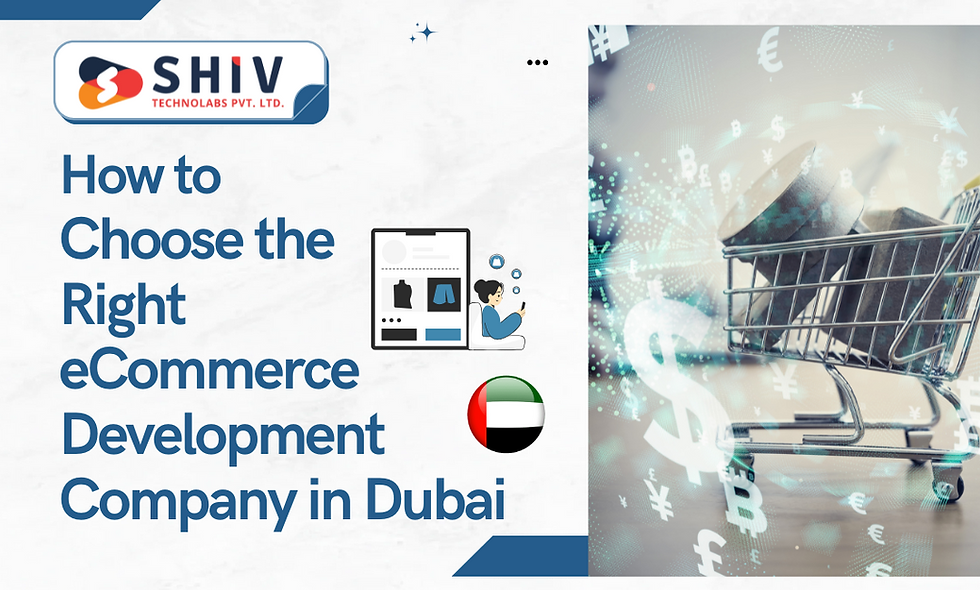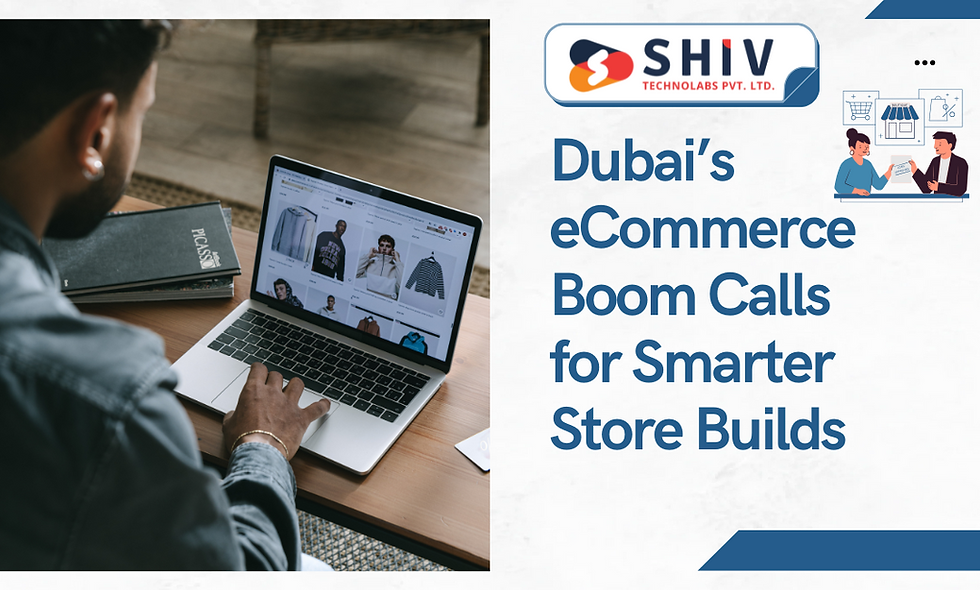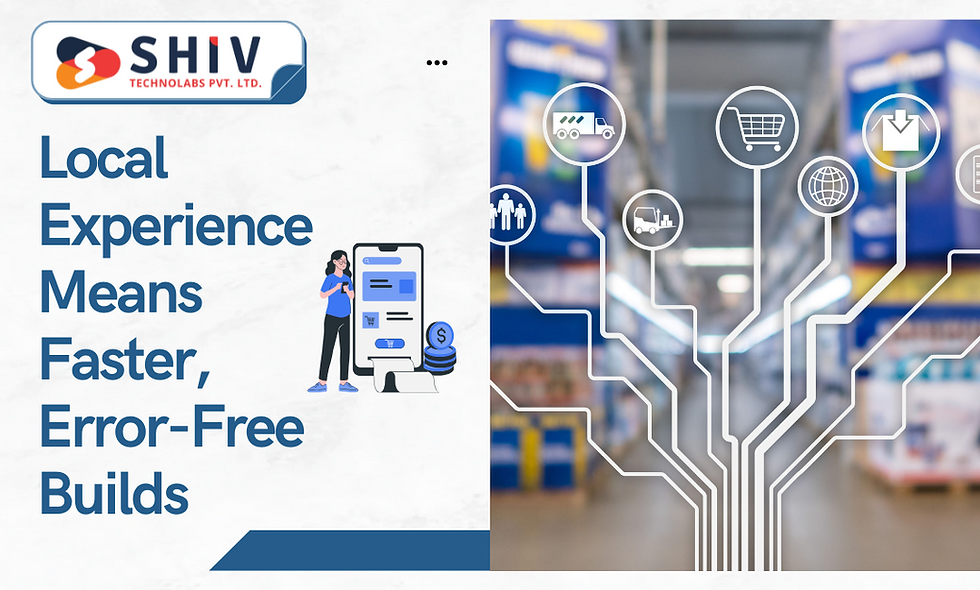How to Choose the Right eCommerce Development Company in Dubai
- Kishan Mehta

- Aug 8, 2025
- 5 min read

Online selling in Dubai is growing fast. From groceries to luxury products, customers expect fast, mobile-ready shopping experiences. But the success of your store depends largely on who builds it.
Finding the right eCommerce Website Development Company in Dubai takes more than a Google search. You need a team that understands the region, offers the right tech stack, and supports you beyond launch.This guide will help you make a smart and confident choice.
Dubai’s eCommerce Boom Calls for Smarter Store Builds

eCommerce in the UAE is expected to cross AED 34 billion by 2026. Customers shop via mobile, prefer flexible payment options, and demand fast local delivery.
This means your website must include:
Multi-language support (English + Arabic)
Mobile-first UI with low load time
Payment gateway integrations (Telr, PayTabs, etc.)
VAT invoicing and real-time tax calculations
Inventory sync with warehouse or POS
Support for COD and card payments
Only a professional eCommerce Website Development Company in Dubai can deliver on all fronts. And the wrong choice can slow you down — or worse, break your store during a sale.
1. Local Experience Means Faster, Error-Free Builds

Dubai has unique rules for payments, taxes, and customer behavior.
A company with local experience already understands:
How to handle Arabic RTL layout in Shopify or Magento
UAE VAT rules and tax-inclusive pricing models
Integration with payment tools like Tabby, Tamara, Telr, or Checkout.com
Cart settings preferred by Dubai shoppers (COD, one-page checkout)
This reduces your project time and helps avoid costly rework.
2. Compare Platform Expertise Before Choosing
Different companies specialize in different platforms.
Here’s a quick comparison to help you decide what fits your business needs best:
eCommerce Platform Comparison Table (Dubai-specific)
Feature | Shopify | Magento Open Source | WooCommerce (WordPress) |
Hosting | Included (cloud-based) | Self-hosted (server needed) | Self-hosted |
Multilingual Support | Via 3rd-party apps | Built-in support | Manual setup or plugins |
UAE Payment Gateway Integration | Easy with apps (Telr, PayTabs) | API-based, needs coding | Plugin-based |
Mobile Performance | Excellent (built-in PWA tools) | Custom PWA development | Theme-dependent |
Cost to Start (AED) | 4,000–8,000 | 12,000–25,000+ | 5,000–10,000 |
Development Time | 2–4 weeks | 6–10 weeks | 3–5 weeks |
Best For | Fast launch, small to mid biz | Large stores with custom UX | Content + product-focused biz |
If your business is launching in 30 days or less, Shopify may be a better fit. For custom shipping logic, ERP sync, or advanced features, Magento is worth the investment.
3. Ask for Code Samples and Git Access
For custom development work, check if the company follows clean, documented coding practices.
Here’s what to look for:
Version control via GitHub or Bitbucket
Modular code structure for future updates
Comments for custom logic or workflows
Code reviews and automated testing pipelines
Mobile-specific breakpoints in CSS or Tailwind setup
This helps avoid messy codebases that crash under load or fail during updates.
4. Key Technical Capabilities to Ask About
Here are some must-have technical services from any top eCommerce Website Development Company in Dubai:
PWA (Progressive Web App) development for fast mobile performance
AppBridge or Polaris integration if using Shopify custom apps
API-first builds for headless commerce support
Server-side caching via Varnish or Redis for Magento
Auto-scaling deployment via Docker + Kubernetes (for enterprise)
Uptime monitoring via Pingdom or StatusCake
These features are vital when your store expects thousands of visitors during a sale or holiday season.
5. Don’t Ignore SEO and Page Speed Practices
Many Dubai stores miss out on traffic because developers skip SEO setups. Ask if your developer offers:
Technical SEO with schema markup
JSON-LD support for product data
Meta tag management (title, OG, alt)
Lazy loading for images and videos
Core Web Vitals score tracking
CDN setup for faster asset delivery (Cloudflare, Akamai)
Speed and SEO aren’t bonuses. They’re mandatory for ranking on Google and converting mobile shoppers.
6. Clarify Post-Launch Support and Security
eCommerce websites in Dubai often face security issues, especially during promotions. Your agency should offer:
SSL configuration and HTTPS redirects
Firewall setup (e.g., Cloudflare WAF)
Monthly security patches
Plugin and theme update checks
Backup and restore options (daily or real-time)
Also, confirm if they offer hosting, or if you’ll manage it separately. For Magento or WooCommerce, VPS or cloud servers (like DigitalOcean or AWS) are preferred.
7. Clear Contracts and No Hidden Charges
Many clients in the UAE complain about hidden fees or delayed timelines. Before signing:
Get a fixed project scope
Request a timeline with milestones
Ask for full source code ownership
Get a separate quote for add-ons or future features
Here’s a breakdown of what typical eCommerce development costs may look like in Dubai:
Sample Cost Breakdown Table
Feature / Service | Estimated Cost (AED) | Timeline |
Basic Shopify Store Setup | 5,000 – 8,000 | 2–3 weeks |
Custom Magento Development | 15,000 – 30,000+ | 6–10 weeks |
Mobile App or PWA | 8,000 – 12,000 | 4–6 weeks |
Arabic Language Integration | 1,000 – 2,500 | 1 week |
Payment + Shipping Integration | 1,500 – 3,000 | 5–7 days |
Annual Support & Maintenance | 4,000 – 10,000 | Ongoing |
Actual cost depends on scope, design, and 3rd-party tools. Always ask for a written proposal.
8. Questions to Ask Before Hiring a Developer
Here are smart questions that help filter qualified teams:
Have you worked with businesses in Dubai or the GCC?
Do you offer bilingual (English/Arabic) builds?
Can I see GitHub samples of your code?
What stack do you recommend for my business goals?
Do you provide post-launch support?
What’s your average response time for bugs?
These answers will show how technically prepared and service-focused the company truly is.
9. Red Flags That Shouldn’t Be Ignored
No live projects in the UAE region
Vague replies about post-launch support
No mention of data protection or GDPR compliance
Cheap pricing without clear scope
Overpromising delivery in under 10 days
Choosing such a team often leads to delays, project restarts, or even lawsuits over contract breaches.
Finding a Trusted eCommerce Website Development Company in Dubai
There are several ways to shortlist trusted companies:
Google reviews and Clutch profiles
LinkedIn company pages with real team members
Social media presence and recent project updates
Portfolio pages that include regional work
Also, attend local tech events or retail conferences to meet agencies face to face. Direct conversations always reveal more than email quotes.
Why Businesses in Dubai Trust Shiv Technolabs
Shiv Technolabs offers tailored eCommerce Website Development Services in Dubai backed by technical precision and local understanding. Our team builds scalable, secure, and high-performance online stores that align with Dubai’s fast-growing retail environment.
We help businesses launch and grow with:
Platform expertise in Shopify, Magento, and WooCommerce
Bilingual store development (Arabic–English)
Payment gateway integrations (Telr, PayTabs, Tabby, etc.)
VAT-compliant invoicing and checkout flows
Mobile-first UX with PWA support
Ongoing maintenance and 24/7 technical support
If you’re searching for a trusted eCommerce Website Development Company in Dubai, our team is ready to help. Contact us to discuss your project requirements and get a custom proposal.
Conclusion
Selecting an eCommerce development company is not just a vendor choice—it’s a technical investment in your business infrastructure. In a fast-moving market like Dubai, your platform must support regional compliance, real-time operations, and high-volume transactions across multiple devices and channels.
From backend architecture and server configuration to frontend responsiveness and third-party integrations, each component must work without friction. Businesses must prioritize companies that offer modular codebases, scalable infrastructure, secure deployment pipelines, and continuous support. Code quality, Git versioning, automated testing, and API-first development are no longer optional—they're foundational for uptime, speed, and long-term agility.



Comments